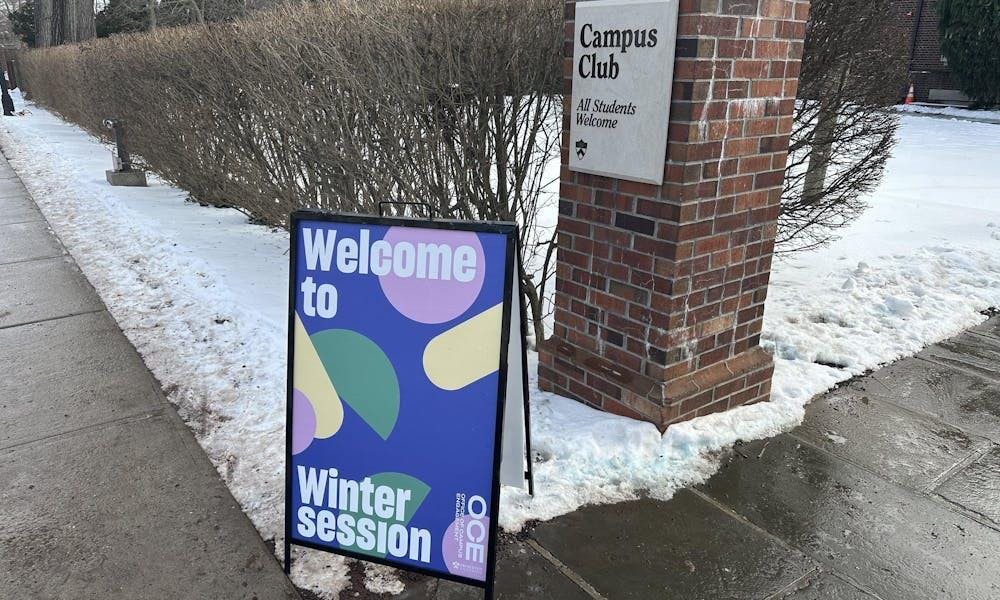“Talking about money” is taboo, to say the least. It’s often skirted as awkward, stressful, or crass, and for me at least, conjures images of a Knives Out-esque spiral of venomous, insecurity-born rivalry. But at Princeton, it won’t be easy to avoid in the wake of Wintersession’s discontinuation, the most recent casualty of University budget cuts.
In May, Princeton asked departments to plan individual budget cuts starting in the summer in light of the Trump administration’s suspension of federal grants and ongoing political uncertainty. The University also implemented a broad-based hiring freeze, pausing most new academic hires.
Departments have been talking over the summer about how to make this financial reality work. As these discussions continue into the fall, we must be aware of how the sensation of imminent threat, the guillotine blade which the Trump administration exalts in dangling over Princeton and its fellow universities, risks the development of an eat-or-be-eaten mentality which may drive those within one institution — people on the same side — against one another in an effort to protect themselves and their funding. It is critical that financial insecurity strengthens rather than fragments the Princeton community; if it doesn’t, our own fear may help the Trump administration to dismantle us.
Such tensions are already mounting in peer universities. Arts and Humanities departments at the University of Chicago have recently undergone “consolidations,” projected to lead to layoffs and reduced class capacity and language instruction. While UChicago maintains that all departments are undergoing comparable change, discourse within the Humanities department have compared the reorganization to the Department of Government Efficiency and its efficiency-obsessed agenda. Such discontentment suggests that academia is already somewhat divided, with certain fields feeling disproportionately targeted.
If we allow our conversations about budget to generate fissures between humanities and sciences, arts and lab research, we risk turning upon ourselves the same transactional, hostile lens through which the Trump administration views higher education. The threat, otherwise, is existential. We are not facing an administration opposed on principle to Wintersession, a particular lab, theater, free food, or any other individual opportunity: The administration’s actions demonstrate a government opposed to Princeton, to education and integrity, as a whole. If we waste our time and energy picking out enemies within our own community, we do Trump’s job for him: We destabilize ourselves, reduce our productivity, and weaken our capacity to notice and confront the wrongs taking place in the nation today.
On the student side, that requires some humility. There isn’t a perfect solution to budget cuts. No amount of debate concerning where and how to trim Princeton’s spending can ultimately avoid noticeable — at minimum — changes to academics and campus life. While it’s important to financially strategize in order to minimize damage, that process remains fundamentally administrative. This is not to minimize the importance of the student voice, but being active and aware throughout the budget cuts process doesn’t only look like campaigning explicitly for the preservation or discontinuation of particular programs.
This isn’t to promote blind trust in the Princeton administration nor passivity among students. Now more than ever, it’s imperative to be informed, even reflective, about our future as members of an academic community. So far, Princeton has a handle on their priorities. While Wintersession goes, they’ve dramatically expanded financial aid — something that a more distrustful student body might have once worried would be cut.
We have to prepare for Princeton to make tough but necessary choices, in which one or more parties will feel that they got the short end of the stick. There are seemingly infinite ways for the University to spend its money: if it comes down, hypothetically, to the HUM trip or Outdoor Action, promotional T-shirts or catered lectures, not everyone can walk away happy. But becoming consumed by every choice, and taking them personally, is both divisive and, perhaps more importantly, pointless. Bickering amongst ourselves will only increase tunnel vision, concentrating our energy on inter-departmental politics and making us lose sight of the much larger concern: a government determined to reduce the resources of its educational institutions.

We won’t all be happy in the age of budget cuts, but we can all understand the unavoidability of tough choices, especially when the threat we’re facing is external, not internal.
Assistant Opinion Editor Lily Halbert-Alexander is a sophomore and prospective English major from San Francisco, Calif. She can be reached at lh1157[at]princeton.edu.









